Digital archive collections and other initiatives to preserve and promote archives related to the field of postcolonial print cultures around the world (list in progress).
Worldwide
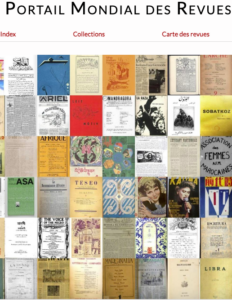 The Portail Mondial des Revues [Global Journals Portal], founded within the framework of INHA (Institut National d’Histoire de l’Art) and fed by the AGORHA database, maps and promotes a census of critical and cultural journals from outside Europe or the diaspora produced during the 19th and 20th centuries, between 1817 and 1989. It contains over 1,000 journal records.
The Portail Mondial des Revues [Global Journals Portal], founded within the framework of INHA (Institut National d’Histoire de l’Art) and fed by the AGORHA database, maps and promotes a census of critical and cultural journals from outside Europe or the diaspora produced during the 19th and 20th centuries, between 1817 and 1989. It contains over 1,000 journal records.
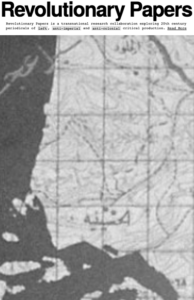
Revolutionary Papers is an international, transdisciplinary research and teaching initiative on anticolonial, anti-imperial and related left periodicals of the Global South. It includes over forty university-based researchers, as well as editors, archivists, and movement organizers from around the world.
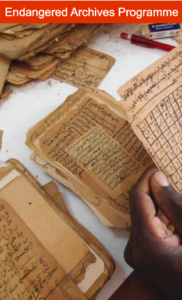 The Endangered Archives Program, held by the British Library, primarily funds digitisation projects to record and preserve the content of archives. It create digital material in a format that facilitates long-term preservation, and at least two copies of these are stored: a primary copy that remains at an appropriate repository in the country of origin, and a secondary copy held at the British Library.
The Endangered Archives Program, held by the British Library, primarily funds digitisation projects to record and preserve the content of archives. It create digital material in a format that facilitates long-term preservation, and at least two copies of these are stored: a primary copy that remains at an appropriate repository in the country of origin, and a secondary copy held at the British Library.
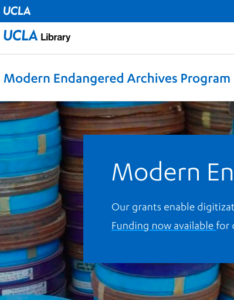 The Modern Endangered Archives Program (MEAP), held at UCLA Library, supports documentation and digital preservation of at-risk cultural heritage materials from the 20th and 21st centuries through Planning, Project, and (now) Regional Grants. MEAP also ensures that all digitized content is visible and discoverable, with over 50,000 digitized objects online now.
The Modern Endangered Archives Program (MEAP), held at UCLA Library, supports documentation and digital preservation of at-risk cultural heritage materials from the 20th and 21st centuries through Planning, Project, and (now) Regional Grants. MEAP also ensures that all digitized content is visible and discoverable, with over 50,000 digitized objects online now.
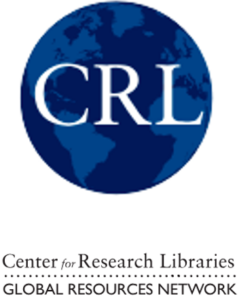
Global Press Archive CRL Alliance hosts 8 digitized newspaper databases, as follows: Daily Observer Digital Archive; El Mundo Digital Archive; Imperial Russian Newspapers; Independent and Revolutionary Mexican Newspapers; Late Qing and Republican-Era Chinese Newspapers; Middle Eastern and North African Newspapers; South Asian Newspapers; Southeast Asian Newspapers.
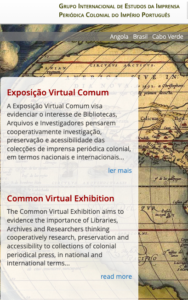 The International Group for Studies of Colonial Periodical Press of the Portuguese Empire presents a virtual exhibition with digitized resources from Angola, Brazil, Cape Verde, Guinea-Bissau, India, Macau, Mozambique, Portugal, Sao Tome and Principe, Timor-Leste, Clandestine and Exiles Presse. A rare interview with Amílcar Cabral can be found here.
The International Group for Studies of Colonial Periodical Press of the Portuguese Empire presents a virtual exhibition with digitized resources from Angola, Brazil, Cape Verde, Guinea-Bissau, India, Macau, Mozambique, Portugal, Sao Tome and Principe, Timor-Leste, Clandestine and Exiles Presse. A rare interview with Amílcar Cabral can be found here.
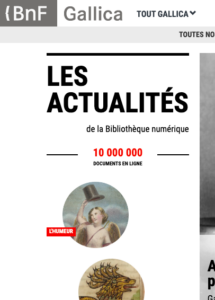 Based on the digitization of the collections of the Bibliothèque Nationale de France, Gallica offers millions of books, press titles and other documents. You can find sections such as Colonial Press, or search by area, such as Africa, the Americas or Asia.
Based on the digitization of the collections of the Bibliothèque Nationale de France, Gallica offers millions of books, press titles and other documents. You can find sections such as Colonial Press, or search by area, such as Africa, the Americas or Asia.
India and South-East Asia
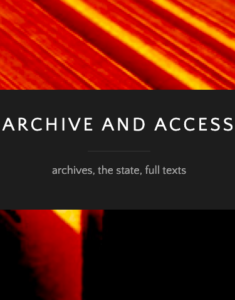 Public Archives India is a consortium of libraries and archives in India and more widely in South Asia, offering a digital catalog for sharing these resources, as well as a selection of texts written by historians.
Public Archives India is a consortium of libraries and archives in India and more widely in South Asia, offering a digital catalog for sharing these resources, as well as a selection of texts written by historians.
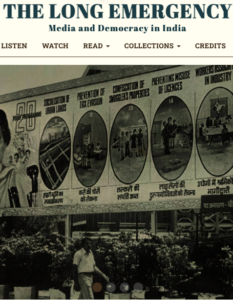 The Long Emergency (Media and Democracy in India) Collection was primarily conceived as a series of oral history interviews documenting journalistic praxis around the time of the Indian emergency (1975-1977), including a selection of material from this period such as films, cartoons, news clippings, government documents, and court judgements.
The Long Emergency (Media and Democracy in India) Collection was primarily conceived as a series of oral history interviews documenting journalistic praxis around the time of the Indian emergency (1975-1977), including a selection of material from this period such as films, cartoons, news clippings, government documents, and court judgements.
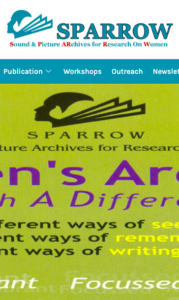 The Sound & Pictures ARchives for Research on Women (SPARROW) is a Mumbai-based archive fonds and an interdisciplinary research project. The idea was not to set up a Women’s Archives as just a collection centre but to create an archives which would be more vibrant and more communicative. The collection assembles multimedia documents (recordings of oral histories, etc.), but also offers a range of publications.
The Sound & Pictures ARchives for Research on Women (SPARROW) is a Mumbai-based archive fonds and an interdisciplinary research project. The idea was not to set up a Women’s Archives as just a collection centre but to create an archives which would be more vibrant and more communicative. The collection assembles multimedia documents (recordings of oral histories, etc.), but also offers a range of publications.
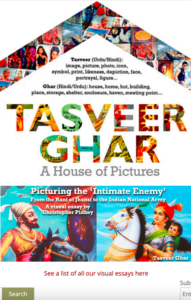 Tasveer Ghar: A Digital Network of South Asian Popular Visual Culture is a trans-national virtual “home” for collecting, digitizing, and documenting various materials produced by South Asia’s exciting popular visual sphere including posters, calendar art, pilgrimage maps and paraphernalia, cinema hoardings, advertisements, and other forms of street and bazaar art.
Tasveer Ghar: A Digital Network of South Asian Popular Visual Culture is a trans-national virtual “home” for collecting, digitizing, and documenting various materials produced by South Asia’s exciting popular visual sphere including posters, calendar art, pilgrimage maps and paraphernalia, cinema hoardings, advertisements, and other forms of street and bazaar art.
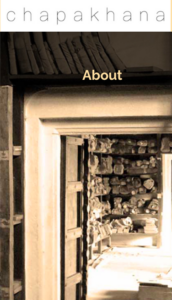 Chapakhana maps the rise of the printing press across South Asia, from the establishment of the first movable type press in 1556 until the year 1900. Illustrating the impact of global technology transfer, it offers users the opportunity to visualize the extent of printing activity in the Indian subcontinent up until the end of the nineteenth century and to identify when printing first came to a particular location.
Chapakhana maps the rise of the printing press across South Asia, from the establishment of the first movable type press in 1556 until the year 1900. Illustrating the impact of global technology transfer, it offers users the opportunity to visualize the extent of printing activity in the Indian subcontinent up until the end of the nineteenth century and to identify when printing first came to a particular location.
 Ideas of India is a database of english language periodicals that proliferated in India through the nineteenth century, but underwent mass extinction after 1947. The database offers a searchable index of the contents of these periodicals and provides links to digitized material where available.
Ideas of India is a database of english language periodicals that proliferated in India through the nineteenth century, but underwent mass extinction after 1947. The database offers a searchable index of the contents of these periodicals and provides links to digitized material where available.

CSSSC Archive is home to digital copies of over 15000 issues of Bangla periodicals, 300 volumes of Assamese periodicals, 27000 issues of Bangla newspapers, 5000 issues of English newspapers, 6000 Bangla books, 300 Hindi books and chapbooks, 300 items in Urdu, 30 items in Nepali, 30 items in Bhojpuri, 180 Assamese books, 8000 manuscripts in Sanskrit, Bangla, and Farsi, 35,000 bromide prints, copy negatives and color photographs, and 20,000 popular prints, paintings, oleographs, lithographs, commercial art items such Bangla advertisements and cartoons. The archive also holds a small but rich collection of ephemera and private papers, including the private papers of historians and social scientists from South Asia.
Africa
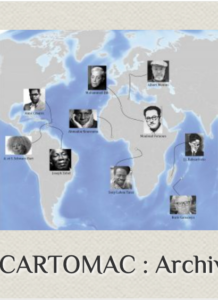
CARTOMAC (Archives littéraires d’Afrique) provides a cartographic listing of African literary archives. Descriptions cover not only the typology of the collection, but also its history and access arrangements.
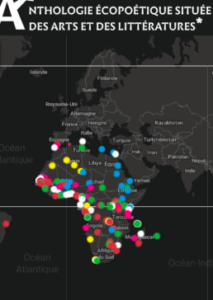
L’Anthologie Écopoétique Située des Arts et des Littératures en Afrique [Situated Ecopoetic Anthology of Arts and Literature in Africa], based on the model of the Gobal Atlas for Environmental Justice, is a project proposing an online cartography of ecologically threatened places on the African continent and the literary and artistic creations made in response.
